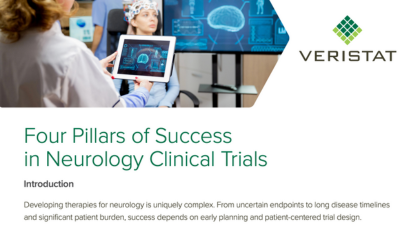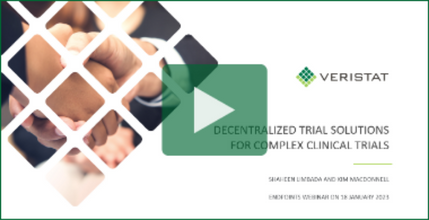Solutions
Natural History Trials for Rare Diseases
Collecting Real World Evidence with Prospective and Retrospective Natural History Studies
Developing a therapy for a rare or ultra-rare disease is life changing work with unique challenges. One of the cornerstones of developing therapies for rare diseases is the use of natural history (or non-interventional) data to help inform the clinical development process. Having completed many full service natural history studies, Veristat’s global team leverages lessons learned from the course of our work supporting 30+ Natural History and Observational trials.
If the ultimate goal is to provide rare disease patients with treatments to extend and prolong life, a natural history study can act as your comparator or control data set in your marketing applications. With our expertise in the rarest, most complex, and never done before novel therapies, we understand the thoughtful planning and conduct needed for successful clinical development.
Overcoming Challenges with Natural History Trials
Rare and ultra-rare diseases demand more complex clinical program planning and involve a complicated regulatory approval process that is full of unknowns. From patient recruitment challenges to navigating the astronomical volume of data to collect and clean – a natural history trial for a rare disease therapy requires an extraordinary amount of coordination.
Veristat ensures that your clinical trial or program design supports your regulatory strategy in this specialized area. Our experienced teams are ready to plan and launch your Natural History trial quickly, providing:
-
Development of your regulatory strategy including pursuing special designations
-
Identification of disease-specific efficacy endpoints and clinical outcomes
-
Identification of medical experts and establishment of global sites
-
Full-service clinical trial planning and project management
-
Agile patient recruitment strategies to support
-
Operational solutions to facilitate retrospective and prospective data collection including biometrics and statistical analysis
-
Preparation of Marketing Applications
Let's Talk.
Contact Veristat Today!
We know there are always unknown challenges when bringing a novel therapeutics to market, so we’ve assembled an extraordinary team of scientific minded experts who have mastered the complexities of therapeutic development enabling sponsors to succeed in extending and saving lives.
In the Past 5 Years
+0
Rare Disease Projects
+0
Rare Disease Marketing Applications Prepared
+0
Rare Disease Marketing Application Approvals in the past 5 years
Amplify Rare Disease Research with a Natural History Trial
Completing a natural history study in conjunction with an interventional study for rare and ultra-rare diseases is critical to understanding the disease and its progression. Natural history data provides many potential uses and benefits for drug developers, including informing the study design and outcome selection of the interventional study. Overall, natural history studies support clinical development in the following ways:
To identify the patient population
May uncover important predictors of disease progression.
May provide evidence for which patient subgroup(s) may benefit from a particular drug trial.
To identify or develop clinical outcome assessments
Can help evaluate the ability of a new or existing clinical outcome assessment to detect change in a particular disease or a pattern of progression of a disease or symptoms of a disease.
Can be used to evaluate the performance and reproducibility of a clinical outcome assessment for use in a clinical investigation.
To identify or develop biomarkers
Can help identify or develop biomarkers that can be diagnostic, prognostic, predictive of treatment response, or useful in guiding patient selection and dose selection in drug development.
Can provide an opportunity to collect specimens and images for use in an analytical validation program.
To serve as a comparator in designing externally controlled studies
Data and information from a natural history study can provide an untreated, external control group for use as the comparator to the treatment group(s) in an investigational drug trial.
Natural history studies can act as a comparator dataset in marketing authorization applications, particularly in rare or orphan disease where patient population are small.
Case Study: The Role of Natural History Studies in Ultra-Rare Disease Trials
Get the presentation that was given at the Orphan Drug Congress Europe 2021. Learn key takeaways and strategies for addressing the challenges of setting up a unique study design and running a complex natural history study for a Canavan Disease gene therapy trial.
Advancing Your Rare Disease Study is Our Mission
Whatever the study’s unique considerations, Veristat’s here to help you get your therapies to approval and patients, faster. Our trusted expertise comes from more than 380 rare and ultra-rare disease projects over the past 5 years including natural history trials for rare cancers, endocrine/metabolic, and genetic diseases. Based on our experience, we believe Natural History studies are most useful in the following circumstances:
-
When it would not be ethical or possible to give a control group a placebo - such as with extremely rare diseases or very small populations.
-
As a means to identify the right patient population(s), including subgroups that may benefit from therapy.
-
When sponsors are considering the use of validated biomarkers as endpoints to help in clinical trial design.
-
To open new communication pathways to relevant study sites, centers that specialize in treatment of rare diseases, and patient advocacy groups.
-
As valuable data to strengthen the understanding of the disease pathway and progression in preparation for Marketing Application for a rare disease.









